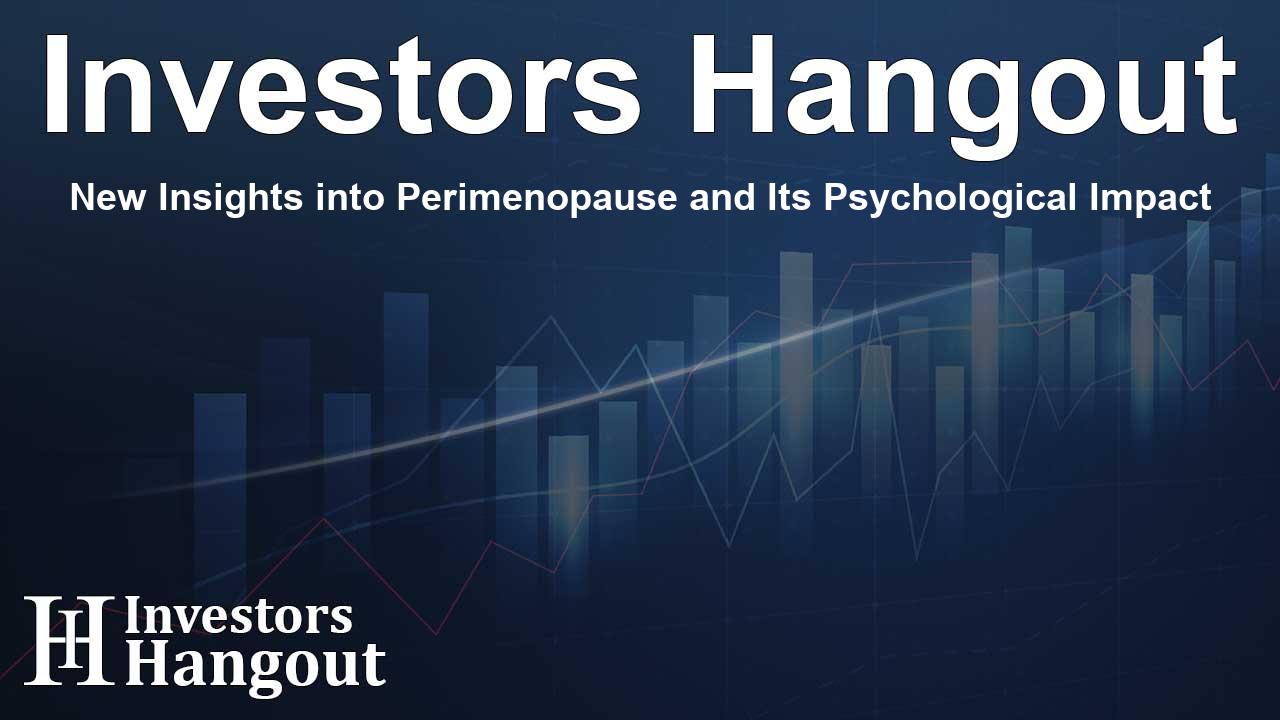New Insights into Perimenopause and Its Psychological Impact

Understanding the Psychological Impact of Perimenopause
Perimenopause is a significant transition in a woman's life, marked by various physical and emotional changes as her body prepares for menopause. A recent study by Flo, the leading women's health app used by millions globally, sheds light on how this phase affects women psychologically. The findings are groundbreaking, showing that many women are not prepared for what lies ahead and often do not receive adequate support.
The Hidden Challenges of Perimenopause
Research indicates that about two-thirds of women aged 36-40 experience moderate to severe perimenopausal symptoms, yet they often wait many years before seeking help. Many women feel unaware and uneducated about menopause, leading to confusion and anxiety. Shockingly, it is reported that over 90% of women did not receive any education about menopause during their schooling years. This lack of information carries into the healthcare system, where a mere 20% of OB/GYN residents receive formal training on menopause.
Breaking the Silence on Psychological Symptoms
The Flo study highlights critical psychological symptoms that appear early in the perimenopausal stage. Mood disturbances, including anxiety and irritability, were notably pronounced among women aged 41 to 45, while physical symptoms such as vaginal dryness were more common in older women. These findings have revealed patterns that were previously overlooked in existing research.
Recognizing Variability in Symptoms
Dr. Jennifer Payne, a co-author of the study, emphasizes that the emotional turmoil can often precede physical symptoms. This progression indicates that emotional well-being should be a focal point in discussions about menopause and healthcare. Understanding these patterns allows healthcare providers to better prepare their patients for what to expect.
Awareness and Action: Improving Women's Health Support
The message is clear: women are suffering in silence. A considerable segment of women aged 30-35 reported experiencing symptoms usually associated with perimenopause. Alarmingly, only a small fraction of those grappling with symptoms choose to visit their doctor for guidance, often waiting until symptoms escalate or until they reach age 56 before seeking help. This trend showcases the urgent need for increased awareness and education surrounding perimenopause and its psychological consequences.
The Call for More Research and Resources
Dr. Payne underlines the necessity for further research to explore the breadth of experiences during perimenopause, especially for younger women. The study identifies a significant gap in medical understanding and support during this life stage, urging healthcare professionals to adopt a more informed and compassionate approach to patient care.
Flo Health: Leading the Charge in Women's Health
Flo Health has emerged as a pioneer in addressing women's health issues and strives to improve the quality of life for millions of women experiencing perimenopause. Its platform not only assists women in tracking their menstrual cycles but also offers personalized insights and a supportive community. With growing user engagement, Flo aims to enhance health literacy and provide access to essential information for women around the world.
Making a Commitment to Future Research
As the study from Flo highlights, the health community must prioritize women's needs, focusing on psychological as well as physical health aspects. With initiatives like the Pass it on Project, which aims to give free access to Flo Premium subscriptions to women in need, Flo is taking actionable steps to ensure that every woman can receive the support she deserves. Furthermore, the success of their Anonymous Mode, recognized as one of TIME's Best Inventions, demonstrates a commitment to privacy and trust in women's health.
Frequently Asked Questions
What is perimenopause and when does it typically start?
Perimenopause is the transitional phase leading up to menopause, usually starting in women's 30s and lasting until menopause when menstrual cycles stop completely.
What symptoms are associated with perimenopause?
Common symptoms include mood swings, anxiety, hot flashes, vaginal dryness, and irregular periods. Psychological symptoms arise early, often before physical changes.
How can women seek help for perimenopause symptoms?
Women experiencing perimenopausal symptoms should consult healthcare providers for guidance and support. Awareness and education are vital for understanding available treatments.
Why is research on perimenopause important?
This research helps to fill the gaps in understanding women's health throughout life changes, enabling better healthcare responses and support systems.
What resources does Flo provide for women in perimenopause?
Flo offers cycle tracking, health insights, and a community for sharing experiences. It aims to educate users about their health and provide personalized support.
About The Author
Contact Hannah Lewis privately here. Or send an email with ATTN: Hannah Lewis as the subject to contact@investorshangout.com.
About Investors Hangout
Investors Hangout is a leading online stock forum for financial discussion and learning, offering a wide range of free tools and resources. It draws in traders of all levels, who exchange market knowledge, investigate trading tactics, and keep an eye on industry developments in real time. Featuring financial articles, stock message boards, quotes, charts, company profiles, and live news updates. Through cooperative learning and a wealth of informational resources, it helps users from novices creating their first portfolios to experts honing their techniques. Join Investors Hangout today: https://investorshangout.com/
The content of this article is based on factual, publicly available information and does not represent legal, financial, or investment advice. Investors Hangout does not offer financial advice, and the author is not a licensed financial advisor. Consult a qualified advisor before making any financial or investment decisions based on this article. This article should not be considered advice to purchase, sell, or hold any securities or other investments. If any of the material provided here is inaccurate, please contact us for corrections.
